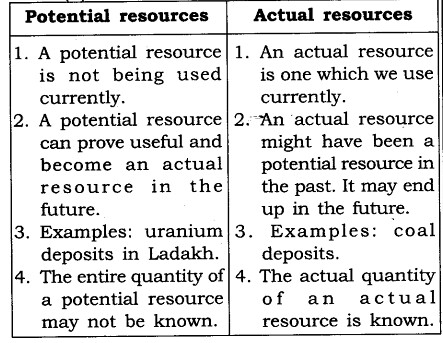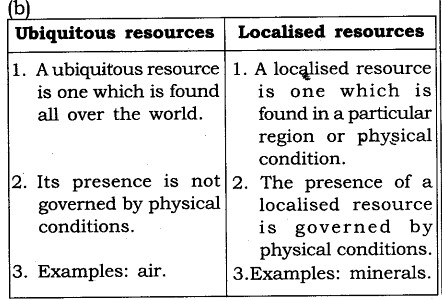NCERT Solutions for Class 8 Social Science Geography Chapter 1 Resources
NCERT Solutions for Class 8 Social Science Geography Chapter 1 Resources
Class 8 Geography Chapter 1 Resources Ncert Textbook Questions Solved
Question 1.
Answer the following questions.
(i) Why are resources distributed unequally over the earth?
(ii) What is resource development?
(iii) Why are human resources important?
(iv) What is sustainable development?
Answer.
(i) Resources are distributed unequally over the’earth because of the different natural conditions, and physical factors like terrain, climate and altitude.
(ii) Resource development is the method of utilising our intelligence in order to improve the quality, usability and utility of a resource.
(iii) Human resources are important because the development of other resources solely depends upon this resource as humans have knowledge, skill, and technology to develop other resources.
(iv) We should use resources in such a balanced way that we satisfy our needs as well as conserve them for the future. This concept is called sustainable development.
Question 2.
Tick the correct answer.
(i) Which one of the following does not make a substance a resource?
(a) utility
(b) value
(c) quantity
(ii) Which one of the following is a human-made resource?
(a) medicines to treat cancer
(b) spring water
(c) tropical forests
(iii) Complete the statement. Biotic resources are
(a) derived from living beings.
(b) made by human beings.
(c) derived from non-living things.
Answer.
(i) (c), (ii) (a), (iii) (a).
Question 3.
Differentiate between the following.
(a) Potential and actual resources
(b) Ubiquitous and localised resources
Answer.
(a)


Question 4.
Activity
“Rahiman paani raakhiye,
Bin paani sab soon.
Paani gaye na ubere Mod, manus, choon…”
[Says Rahim, keep water, as without water there is nothing. Without water pearl, swan and dough cannot exist.] These lines were written by the poet Abdur Rahim Khankhanam, one of the nine gems of Akbar’s court. What kind of resource is the poet referring to? Write in 100 words what would happen if this resource disappeared?
Answer.
The resource referred to by the poet is the water. It is one of the most indispensable resources of life. It can be said to be one of the preconditions of life, like air. Firstly, water serves the most basic purpose of drinking, without which life is not possible. In the absence of water, one would be unable to clean clothes, utensils, or even take a bath. Farmers depend on water for irrigation. Rainwater is so important for proper agriculture. Water is also used in cooking food. Nowadays water has proved to be a useful source of electricity. Besides human beings, plants require water for their growth. Water is also required for various industrial purposes in factories. In short, no form of life can go on without water.
Class 8 Geography Chapter 1 Resources Exercise Questions
Question 1.
Choose the correct option.
(i) Which of these is not a resource?
(a) the Indian Prime Minister
(b) your Geography book
(c) a small piece of paper
(d) none of these
(ii) Which of these does not have economic worth but is valuable?
(a) shoes
(b) mountains
(c) coal
(d) none of these
(iii) The types of resources on basis of stock are
(a) ubiquitous and localised
(b) actual and potential
(c) renewable and non-renewable
(d) abiotic and biotic
(iv) Which of the following is a non-renewable resource?
(a) solar energy
(b) water
(c) soil
(d) natural gas
(v) Which of these is an example of sustainable development?
(a) ignoring the lights when they are switched on but not required
(b) not wasting paper
(c) using coal and petroleum deposits at a fast pace
(d) none of these
Answer.
(i) (d), (ii) (b), (iii) (c), (iv) (d), (v) (b).
Question 2.
Fill in the blank spaces given to complete each sentence.
- A substance becomes a resource if it has …………..
- ………….. and …………. are two important factors which make a substance a resource.
- On the basis of the level of development, resources are classified into ……………. and …………..
- An actual resource to crazy might have been a ……………. resource some time ago.
- Windmills generate …………..energy which is a resource because it will never end up.
- Although renewable resources can be replenished, we should be …………… regarding their use.
- Coal and petroleum are examples of ………….. resources.
- Air is a ubiquitous resource since it is found ………………..
- Physical factors affecting the presence of a localised resource are …………….., ………………, and ……………
- Using resources carefully and giving them time to get renewed is called ………………..
Answer.
- utility
- time, technology
- actual, potential
- potential
- wind, renewable
- careful
- non-renewable
- everywhere
- terrain, altitude, climate
- resource conservation.
Question 3.
State whether each of the following statements is true (T) or false (F).
- We should wastewater since it is a renewable resource and we do not need to be careful in its use.
- A resource always has the same economic value.
- With respect to electricity, water was a potential resource until a few years back.
- All natural sources of energy are renewable.
- A farmer is a human resource.
- Resources need to be conserved for future generations.
- Sustainable development is a way to use resources carefully as well as saving them for the future.
Answer.
- False
- False
- True
- False
- True
- True
- True.
Question 4.
Match the items given in Column I correctly with those given in Column II.

Answer:
(i) (d), (ii) (a), (iii) (e), (iv) (b), (v) (c).
Class 8 Geography Chapter 1 Resources Very Short Answer Type Questions
Question 1.
What is the condition for a substance to be called a resource?
Answer:
A substance needs to have some utility to be called a resource.
Question 2.
What do you understand by the word “utility”?
Answer:
If a substance can be used in any way, it is said to have a utility.
Question 3.
What are the natural resources?
Answer:
Resources that are drawn directly from nature are called natural resources.
Question 4.
What is the name given to the type of resources that have limited stock?
Answer:
The resources having limited stock are called non-renewable resources.
Question 5.
How are resources classified according to their distribution?
Answer:
On the basis of their distribution, resources are classified into ubiquitous and localised.
Question 6.
Give three examples of abiotic resources.
Answer:
Air, land, soils.
Question 7.
How are human-made resources different from natural resources?
Answer:
Human-made resources have been created by human beings, whereas natural resources are provided by nature.
Question 8.
What is human resource development?
Answer.
Improving the quality of human skills in order to make them more useful is called human resource development.
Class 8 Geography Chapter 1 Resources Short Answer Type Questions
Question 1.
Explain the terms of resource conservation and sustainable development.
Answer.
Resource conservation is the concept of using resources carefully so that they do not end up quickly. The future generations also need the resources, but if we keep using them at a fast pace, they may end up, thus posing problems for the future. We should use resources in such a balanced way that we satisfy our needs as well as conserve them for the future. This concept is called sustainable development.
Question 2.
Why are human beings resources?
Answer.
Human beings are intelligent living beings. They can use their intelligence to realise the utility of substances. Had there been no humans, the resources would not have been resources. Human beings are interdependent on each other, and they prove useful to each other. For example, a postman renders us an important service, so he is a resource.
Question 3.
Explain how resources are classified broadly.
Answer.
Resources are broadly classified into natural, human-made and human. Natural resources are those that are taken from nature. They are used without modifying them, i.e. in the same form as they exist in. Rivers, lakes, air, soils, minerals, trees, mountains, etc. are natural resources. Human-made resources have not been provided to us by nature. Human beings have used their intelligence to manufacture them for their own use. Examples include vehicles, buildings, roads, telephones, etc.
Human resources include people who serve us in any way. A teacher, doctor, carpenter, cobbler, etc. are human resources.
Question 4.
Write a short note on the significance of time and technology in making a substance a resource.
Answer.
Time and technology are important factors in making substances resources. With time, technology develops. As technology develops, we begin to discover new ways to make life better. In this process, certain substances which were useless to us earlier become useful. An invention and discovery give us new resources. An example is a hydroelectricity. This technology has made water a source of electricity.
Question 5.
As human beings, how can we ensure sustainable development?
Answer.
Since we live on the earth, it is our duty to practice sustainable development. We can do this by ensuring that:
- The usage of renewable resources is sustainable,
- The diversity of life on earth is maintained,
- The damage caused to nature by our activities is’as Tow as possible.
Class 8 Geography Chapter 1 Resources Long Answer Type Questions
Question 1.
Describe how resources are classified.
Answer.
Resources are broadly classified into natural, human-made, and human. Natural resources are those that are taken from nature. They are used without modifying them, i.e. in the same form as they exist in. Rivers, lakes, air, soils, minerals, trees, mountains, etc. are natural resources. Human-made resources have not been provided to us by nature. Human beings have used their intelligence to manufacture them for their own use. Examples include vehicles, buildings, roads, telephones, etc.
Human resources include people who serve us in any way. A teacher, doctor, carpenter, cobbler, etc are human resources.
On the basis of level of development, a resource can be actual or potential. An actual resource is one which is used currently. We know their quantity. A potential resource is one whose utility is not known at present or is not used despite having utility; instead, it may be useful at some time in the future. It means that it has the potential to have utility, although it does not have any today.
On the basis of origin, a resource can be abiotic or biotic. Abiotic resource is one that has life. Anabiotic resource is non-living. Natural resources may also be classified as renewable and non¬renewable. A renewable resource can be used without any risk of its ending up. They exist in unlimited quantities. On the other hand, the use of non-renewable resources needs to be controlled since once they end up, they cannot be renewed.
On the basis of distribution, a resource can be ubiquitous or localised. A ubiquitous resource is found everywhere. A localised resource is however found in certain parts of the world only.
More CBSE Class 8 Study Material
- Maths NCERT Solutions Class 8
- Science NCERT Solutions Class 8
- CBSE Class 8 Social Science Questions and Answers
- English NCERT Solutions Class 8
- NCERT Solutions for Class 8 English Honeydew
- NCERT Solutions for Class 8 English It So Happened
- Hindi NCERT Solutions Class 8
- Sanskrit Ruchira Class 8 Guide Download
- NCERT Solutions